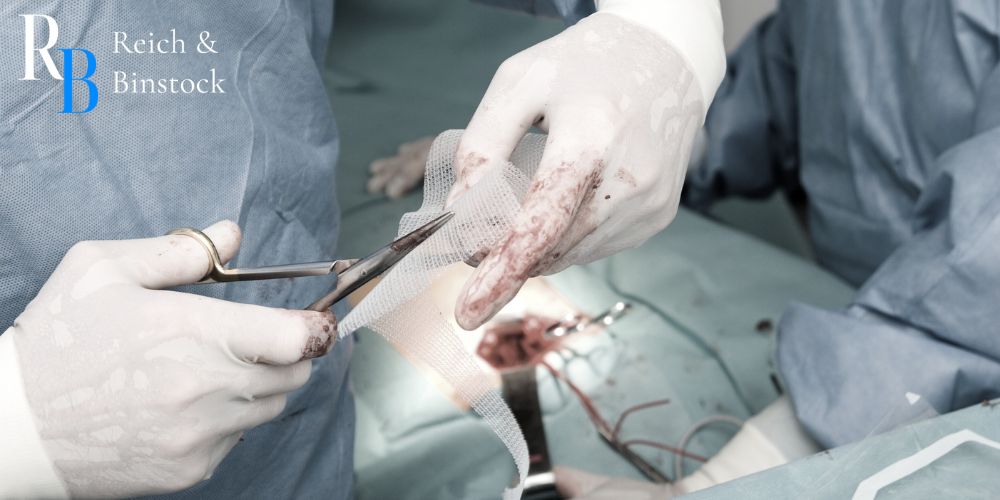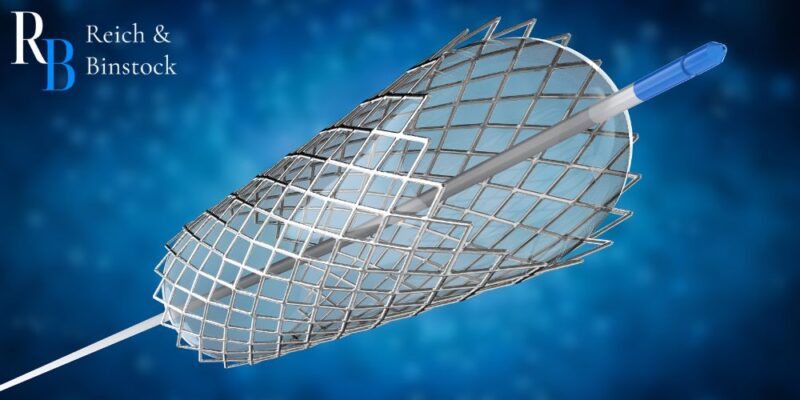Hernia Mesh Lawsuit Attorney in Houston, Texas
MEDICAL DEVICE & PHARMACEUTICAL INJURY
Top Hernia Mesh Lawyers in Texas

Table of Contents
Our experienced defective medical device attorneys at Reich and Binstock are currently investigating claims that certain hernia surgical mesh implants are defective and have caused serious injuries to hernia surgery patients. If you have been harmed by defective hernia mesh, you may have the right to file a hernia mesh lawsuit for compensation.
Because of the litany of adverse and potentially serious side effects, patients nationwide are filing hernia mesh lawsuits against manufacturers. In fact, the Bard hernia mesh MDL is the second-largest mass tort lawsuit. The largest mass tort lawsuit is the 3M earplugs MDL.
The hernia mesh lawsuits allege that the manufacturers are liable for the following.
- Manufacturing a defective product
- Failing to adequately test hernia mesh
- Failing to warn the public about the risks of the hernia mesh
- Intentionally, knowingly and recklessly concealing information about the defective mesh
- Intentionally misrepresenting the quality and safety of hernia mesh
- Negligently designing and marketing unsafe hernia mesh
If you or someone you love has sustained injuries from hernia mesh complications, you may be eligible for a hernia mesh lawsuit in Texas. Reich & Binstock also handles other medical device cases, such as those related to the recent Exactech recall of various joint replacement implants.
To find out if you have a case, contact a hernia mesh lawyer with Reich & Binstock at 713-622-7271 today. Schedule your free initial consultation to learn more about your rights as a victim of hernia mesh failure.
Hernia Mesh Lawsuit Update July 2023
As of July 2023, cases involving defective hernia mesh devices are ongoing. Many hernia mesh MDL cases are pending, but new hernia mesh lawsuits continue to be filed. In October 2023, the third bellwether trial in the Bard hernia mesh MDL is set to begin. The hernia mesh lawsuit process is long and complicated, but you don’t have to tackle it alone. Contact our qualified hernia mesh lawyers to learn more about your rights as a victim or about the current status of the hernia mesh litigation.
Hernia Mesh Lawsuit Timeline
Other notable hernia mesh lawsuit news from 2023 includes the following.
- April 2023: Ethicon dismisses multiple hernia mesh cases from the ongoing MDL, which is still open despite a hernia mesh settlement in September 2021.
- March 2023: The hernia mesh MDL judge postpones the third Bard hernia mesh MDL bellwether trial again. It is rescheduled for October 2023 as per Bard’s request. The number of hernia mesh cases for each company involved increased to the following: Covidien – 362, Ethicon – 1,455, Atrium – 3,393, Bard – 18,988.
- February 2023: The bellwether hernia mesh trial judge postpones the third bellwether to May 2023. Bard now has 18,813 pending hernia mesh claims.
Hernia mesh plaintiffs should not feel discouraged by the lengthy process of filing hernia mesh lawsuits. With help from our hernia mesh lawyers, you can rest assured that we will keep you informed of any updates to your case.
Hernia Mesh Lawsuit Settlement Amounts 2023
Hernia mesh victims have begun to receive settlement payouts, but the amounts vary significantly. Depending on the specific facts of a case, hernia mesh settlement amounts could range from a few hundred thousand dollars to a few million dollars.
For example, the second trial against Bard resulted in a relatively small verdict of $255,000. However, another state case against Bard in Rhode Island resulted in a jury verdict of $4.8 million. This is a significant settlement amount.
Many hernia mesh lawyers believe this large settlement could significantly support pushing for a global hernia mesh settlement. As more hernia mesh cases settle, we will have a better understanding of how much your case might be worth.
Is Hernia Mesh Safe in 2023?
According to the FDA, less than 10% of inguinal groin hernias were treated without mesh before the turn of the century. Over three-quarters of the million repairs performed in the United States yearly are for inguinal groin hernias.
Furthermore, medical scientific data research has confirmed that mesh used for hernia repair increases the likelihood of the wound not reopening. Given this information, it’s worth noting that the FDA admits some adverse medical occurrences connected to hernia mesh in the past, but that many of these were tied to devices that have since been recalled.
So, following a careful risk-benefit review with your treating physician, hernia mesh repair can be a safe procedure. There are also additional dynamics to consider in terms of your own health and aggravating issues before restoration.
Ultimately, hernia mesh products other than those which have been recalled are considered safe and effective for the majority of patients.
What Is a Hernia?
When an organ or fatty tissue squeezes through a weak area in the surrounding muscle or connective tissue (fascia), this causes a hernia. Inguinal (inner groin), incisional (coming from an incision), femoral (outer groin), umbilical (belly button), and hiatal hernias (upper stomach) are the most frequent types of hernias.
Many people who have hernias can see them appear and disappear during certain activities or positions. Not all hernias cause notable symptoms, but most will eventually require surgical repair.
Types of Hernias
- Inguinal hernia: The intestine or bladder protrudes through the abdominal wall or into the inguinal canal in the groin in an inguinal hernia. Inguinal hernias account for around 96 percent of all groin hernias, and the majority of them arise in males due to an inherent weakness in this region.
- Incisional hernia: The intestine pushes through the abdominal wall at the site of prior abdominal surgery in an incisional hernia. This is particularly frequent in older or overweight persons who have undergone stomach surgery and are now sedentary.
- Femoral hernia: The intestine enters the canal carrying the femoral artery into the upper thigh, causing a femoral hernia. Femoral hernias are more frequent in women, particularly pregnant or obese women.
- Umbilical hernia: A portion of the small intestine goes through the abdominal wall at the navel in an umbilical hernia. It is most prevalent in infants, but it can also affect obese mothers or those who have had a lot of children.
- Hiatal hernia: Hiatal hernias occur when the upper stomach squeezes through the hiatus. The hiatus is a hole in the diaphragm through which the esophagus travels.
Are Hernias Common?
In the United States, about 1 million hernia repairs are performed yearly. Hernias are a very prevalent medical issue that can affect both men and women, as well as children.
Internal organs or tissues protrude through the muscular wall of tissue that contains them, causing a hernia. It can occur when a muscle has a weak area, whether it was there at birth or as a result of tension and overexertion. You could detect a bulge or discomfort, but hernias can sometimes go unnoticed for long periods.
What Treatment Options Are Available for Hernias?
According to the FDA, there are both non-surgical and surgical treatment options for hernias.
Non-Surgical Treatment Options for Hernias
The most common nonsurgical treatment option for a hernia is to simply “wait and see.”
With this option, your doctor will monitor the hernia to ensure it is not getting larger or causing complications. Watchful waiting is an option for people who do not have complications or symptoms with their hernias.
Surgical Treatment Options for Hernias
The surgical treatment options for hernias include the following.
- Laparoscopic repair: The surgeon makes several small incisions in the abdomen that allow surgical tools into the openings to repair the hernia. Laparoscopic surgery can be performed with or without surgical mesh.
- Open repair: The surgeon makes an incision near the hernia and the weak muscle area is repaired. An open repair can be done with or without surgical mesh. Open repair that uses sutures without mesh is referred to as primary closure. Primary closure is used to repair inguinal hernias in infants, small hernias, and strangulated or infected hernias.
What Is Surgical Hernia Mesh?
Surgical mesh is a medical device that is used to provide weaker or injured tissue more support. Most surgical mesh devices on the market today are made of synthetic materials or animal tissue. A surgeon may opt for a hernia mesh implant to further strengthen the repaired tissue. This can reduce the risk of recurrence of hernias.
Knitted & Non-Knitted Hernia Mesh
Knitted mesh and non-knitted sheet types of surgical mesh composed of synthetic materials are available. Absorbable, non-absorbable, or a mix of absorbable and non-absorbable synthetic materials can be utilized.
Animal-Derived Mesh
Animal-derived mesh is produced from animal tissue, such as intestines or skin, that has been treated and sterilized to be appropriate for use as an implanted device. These meshes generated from animals are absorbable. Most of the tissue utilized to make these mesh implants comes from pigs or cows.
Non-Absorbable Mesh
Non-absorbable mesh is considered a permanent implant since it will remain in the body forever. It’s utilized to give the repaired hernia some long-term support. Over time, the absorbable mesh will deteriorate and lose strength. It is not designed to offer long-term repair site reinforcement. New tissue development is designed to strengthen the repair as the material declines.
When Is Hernia Mesh Used?
Hernia mesh is a form of surgery mesh that is mostly used for hernia repair surgery. During hernia mesh surgery, the mesh is placed across the weakened area, then attached with surgical sutures. Because the mesh is porous, this texture allows new tissue to grow into and around the hernia mesh products. Ultimately, it supports the repair of damaged muscle tissues in the area.
Why Is Hernia Mesh Causing Problems?
Pain, infection, hernia recurrence, scar-like tissue that sticks tissues together, bowel obstruction, bleeding, and abnormal connection between organs, intestines, and vessels are the most common adverse events for all surgical repair of hernias. This is the case with or without mesh according to the FDA’s analysis of medical device adverse event reports and peer-reviewed scientific literature.
For hernia mesh repair, pain, infection, hernia recurrence, adhesion, and bowel obstruction are the most frequent side effects. Mesh migration and mesh shrinkage (contraction) are two more possible complications that might arise after mesh hernia surgery.
Many of the FDA-reported problems associated with surgical mesh hernia repair have been linked to recalled mesh products that are no longer on the market. Recalled mesh devices were the leading cause of intestinal perforation and obstruction problems, according to the FDA’s review of medical adverse event data.
What Injuries Could Lead to Hernia Mesh Lawsuits?
Many hernia mesh claims, including the Bard hernia mesh lawsuits, list certain complications arising from defective hernia mesh products. Some of the most common hernia mesh complications that have led to lawsuits include the following.
- Chronic pain
- Infections
- Adhesion, which occurs when the hernia mesh implants stick to other tissue or organs
- Bowel obstruction
- Internal bleeding
- Bulging
- Mesh shrinkage
- Fistula, which is the abnormal adhesion of body parts to other structures
- Fluid buildup, or seromas
- Mesh migration
- Nerve damage
- Recurring hernias
- Revision surgeries
When complications arise, revision hernia mesh surgery is common. In fact, it is often necessary to repair the damage done by defective hernia mesh.
Symptoms of a Defective Hernia Mesh Implant
It’s important to be able to recognize the telltale signs of defective hernia mesh products and complications. If you experience any of the following symptoms after having a hernia repair with surgical mesh, contact your doctor right away.
- Pain, discomfort, stiffness, bruising, swelling, bulging, or a burning sensation
- Nausea and digestive problems
- Fatigue, fever, inflammation, or other flu-like symptoms
- Bowel blockage, constipation, fissures, bowel perforation, or hemorrhoids
- Erectile dysfunction
- Recurring hernias
Have Any Hernia Mesh Product Recalls Been Issued?
Between February 2005 and February 2019, the FDA recalled over 211,000 hernia mesh units. Patients experienced hernia mesh injuries, the mesh product had a high failure rate, or the packaging was insufficient and created a danger of damage, prompting the recalls.
For more than a half-dozen products, the bulk of hernia mesh damage claims have been filed against four manufacturers — Atrium, Bard, Covidien, and Ethicon – and have been successful. A jury concluded that Bard’s hernia mesh product caused the plaintiff’s injuries in a 2010 case and awarded a $1.5 million judgment.
Bard agreed to a $184 million settlement with more than 2,000 other claimants due to the case. There will likely be a slew of further settlements and judgments in favor of the plaintiffs. Unfortunately, many cases were paused or delayed due to restricted court access during COVID-19.
Many cases have since resumed, and bellwether trials have been scheduled for later this year.
How Many Hernia Mesh Lawsuits Are There?
As of 2023, there are several federal hernia mesh MDLs with a total of more than 20,000 lawsuits total. Each one is suing a different medical equipment company. C. R. Bard alone is defending more than 18,000 hernia mesh lawsuits. While thousands of hernia mesh lawsuit cases have already been settled, thousands more still wait.
Is It Too Late to File a Hernia Mesh Lawsuit?
The statute of limitations for filing a hernia mesh claim for compensation varies by state. In most state courts, the victims have just a year or two to file a lawsuit after discovering their hernia mesh damage. The best way to know whether you qualify for a hernia mesh lawsuit is to speak with a hernia mesh class action lawyer. We can evaluate the facts of your claim and determine if you are still eligible to pursue hernia mesh litigation.
Am I Eligible for a Hernia Mesh Lawsuit?
If you underwent hernia mesh surgery and had significant problems, you may be qualified to bring a hernia mesh lawsuit. This is especially true if Ethicon, Atrium, or Bard Davol manufactured the mesh.
There are a few fundamental conditions for eligibility, which vary depending on the patient or legal firm taking cases.
The most common eligibility requirements include but aren’t limited to the following.
- Hernia repair surgery for the first time with mesh on or after January 1st, 2006
- More than 30 days after surgery, the patient suffered significant injuries such as adhesions, hernia recurrence, intestinal obstruction, mesh migration, organ perforation, or infection
- Hernia revision surgery or additional surgery was necessary due to complications
- Additional surgery was scheduled due to complications
- The surgeon recommended additional surgery due to complications
- A medical professional advised that you need surgery due to complications, but cannot have it because of medical issues
When you speak with an attorney before you file a hernia mesh claim, they will likely ask you several questions about your situation. Generally, they will need to know the following information.
- Name of the hospital where the hernia surgery occurred
- Type of medical condition you had
- Name of your doctor
- Date of your surgery
- Brand and manufacturer of the hernia mesh device
- Date when you first noticed symptoms or complications
What Is the Average Payout for Hernia Mesh Lawsuit?
A typical settlement amount for hernia mesh litigation varies dramatically, as it does for many medical malpractice or product liability cases.
The average compensation for faulty hernia mesh is influenced by several factors. The type of hernia mesh used in the repair operation, as well as whether or not the FDA or the manufacturer recalled the product, are some of these considerations.
Other key factors which impact hernia mesh lawsuit settlement amounts include:
- Severity and extent of the injuries
- How those injuries impacted the victim’s quality of life
- The economic impact of medical bills, surgeries, lab tests, and other related expenses
- The degree to which the victim’s ability to work suffered or will suffer
- Amount of current and future lost income
- Whether the lawsuit is individual or collective
The amount you receive in a hernia mesh lawsuit settlement is determined by the unique circumstances of your case, such as your total medical bills. Of course, speaking with a reputable hernia mesh lawyer can give you a better idea of what to expect.
An examination of previous settlements in the United States, however, can be used as precedent regarding how much you may get in a hernia mesh claim. If you settle a failed mesh case, one person may get anything from $3,000 to $1 million, according to prior settlements. Previous hernia mesh lawsuit payouts ranged from $40,000 to $60,000 for each plaintiff.
Again, we strongly advise that you speak with an attorney about the specifics of your case. This is the best way to determine the potential hernia mesh settlement amounts you could receive.
What Damages Can I Get in a Hernia Mesh Settlement?
In a hernia mesh lawsuits claim, patients affected by defective mesh could see the following forms of compensation.
- Medical expenses, including the cost of revision hernia surgeries
- Lost wages or loss of earning capacity
- Hospital fees
- Pain and suffering
- Loss of consortium
Why Should Victims File Hernia Mesh Lawsuits?
If you have suffered losses because of hernia mesh failure, you deserve compensation for those losses. Negligent hernia mesh manufacturers must be held responsible for failing to produce safe products. Unsafe hernia mesh products have resulted in significant damages for thousands of innocent patients.
Anyone with a valid hernia mesh case deserves full and fair compensation for the pain and other serious complications they have endured. Speak with a qualified product liability lawyer to learn more about your options. You may attempt to file an individual claim or join one of the ongoing hernia mesh class action lawsuits.
Statute of Limitations for Hernia Mesh Cases
In Texas, the statute of limitations for filing a hernia mesh lawsuit is 2 years after the day that the harm occurred. New hernia mesh lawsuits are still possible if the plaintiff does not miss the statute of limitations. Speak with an attorney if you are unsure of whether you have missed the 2-year deadline.
Hernia Mesh Wrongful Death Lawsuit
Unfortunately, some hernia mesh complications have even led to the wrongful death of the patient. If you have lost a loved one because of hernia mesh failure or related complications, you may have a valid wrongful death hernia mesh case. Hernia mesh cases involving wrongful death are often very complicated. For this reason, you should seek counsel from an experienced wrongful death attorney with considerable experience in defective medical device cases.
Hernia Mesh Lawsuit FAQs
How Can I Know If My Hernia Mesh Implant Failed?
If you are unsure if your hernia mesh device has failed, you should speak with your doctor. Hernia mesh implants that are placed correctly and that work as intended should not produce pain and other negative effects for the patient. However, defective hernia mesh products often produce symptoms such as pain, nausea, swelling, bulging, and others.
What Should I Do If I Know My Hernia Mesh Has Been Recalled?
If you have undergone hernia repair surgery in the past, you may wonder if the hernia mesh products used in your surgery have been recalled. As of 2019, hernia mesh recalls affected more than 211,000 units since 2005. One way to know if your implant was affected by the recall is identifying the hernia mesh manufacturer of your device.
Currently, Atrium Medical Corp hernia mesh, Kugel hernia mesh, Ethicon hernia mesh, and Bard hernia mesh are the main products that have been recalled. The number of Bard hernia mesh lawsuit cases is by far the largest, with nearly 20,000 lawsuits filed.
Can Hernia Mesh Cause Complications Later?
Yes, absolutely. Symptoms of serious complications from defective hernia mesh devices may arise weeks, months, or even years after the original surgery. If defective mesh is left unchecked for too long, it could result in the following complications.
- Pelvic organ prolapse
- Chronic pain
- Stress urinary incontinence
- Infections
- Bowel obstructions
- Sexual dysfunction
How Much Does It Cost to File Hernia Mesh Lawsuits?
Hernia mesh lawsuits aim to compensate victims for their losses related to defective hernia mesh complications. Our hernia mesh attorneys understand that this is a stressful time for victims, and we want to avoid adding to that stress. That’s why we operate on a contingency fee basis. This means that we don’t accept a cent from you unless we secure a recovery on your behalf.
Do I Need a Hernia Mesh Attorney for My Case?
While you are not required to seek legal counsel, we strongly recommend working with an experienced hernia mesh lawyer for your case. Because of the complex nature of these cases, it is incredibly difficult to handle them without an attorney on your side. Having a skilled attorney with experience in product liability and mass tort litigation is crucial. We will evaluate the facts of your case, determine its approximate value, and ensure that your rights are protected throughout the process.
Is There a Hernia Mesh Class Action Lawsuit?
The hernia mesh lawsuits are not part of a traditional class action case. However, the individual cases filed as product liability claims are still treated similarly to class actions in that they are consolidated in the multidistrict litigation (MDL) process. These cases are consolidated and assigned to a single judge who presides over the hernia mesh trial.
For example, the Bard hernia mesh litigation involves nearly 20,000 plaintiffs. It would take far too long for each case to go to court for an individual hernia mesh settlement. Hernia mesh MDL cases allow all victims to be heard, while still preserving the efficiency of the court system.
How Long Does It Take to Settle a Hernia Mesh Lawsuit?
In general, hernia mesh settlement negotiations can take anywhere from three to seven years. Certain individual cases may take a longer or shorter amount of time, but these cases involve complex litigation. Due to the nature of the cases and the potential for high-dollar settlements, mesh manufacturers will push back as much as they can against plaintiffs’ claims.
Additionally, each case is unique in some way. Your particular case may be simpler or more complex than someone else’s case. To get a better idea of how long it might take for your case to settle or reach a verdict, speak with the skilled attorneys at Reich & Binstock.
Contact an Experienced Hernia Mesh Attorney with Reich & Binstock Today
If you or someone you know has suffered health issues due to hernia mesh, call us at 713-622-7271 or fill out our contact form below for a free and confidential consultation about your legal options. From our office in Houston, we represent clients nationwide who have been injured by defective medical devices, including hernia mesh.
There is never a fee unless we recover on your behalf.
Additionally, clients are not obligated to pay expenses if a recovery is not made.




















